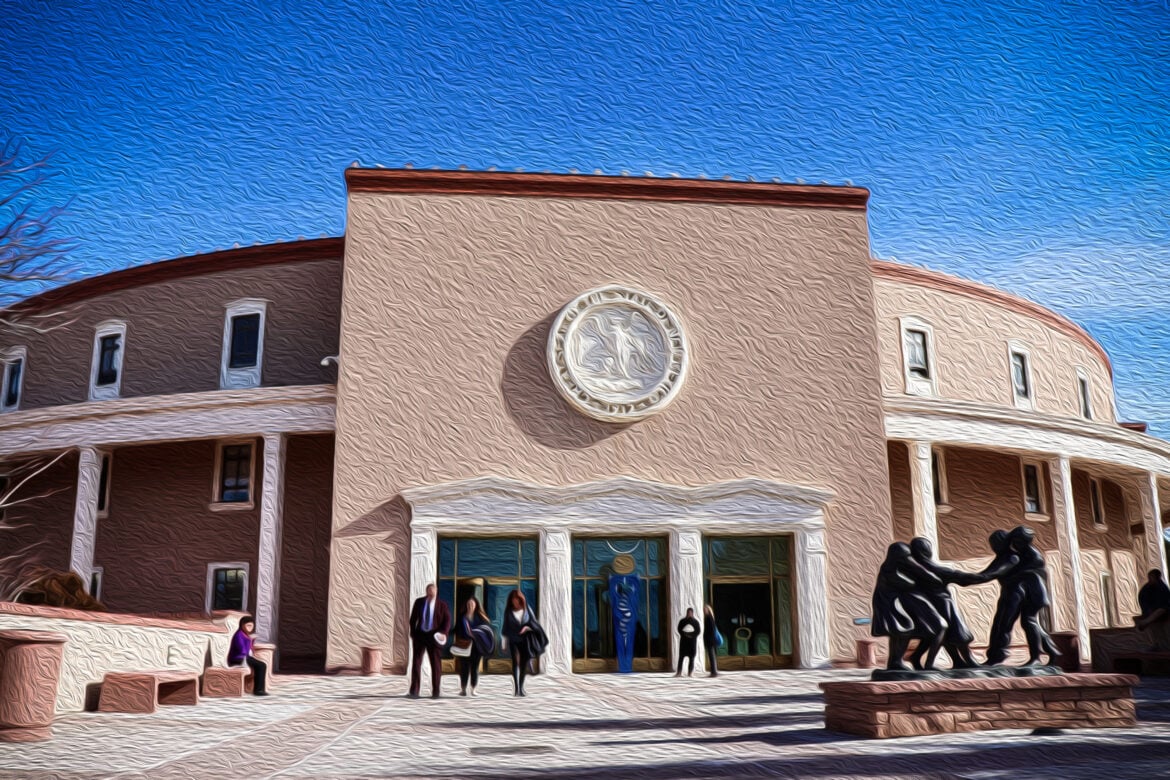Advocates of a proposed trust fund that would give New Mexico’s tribes more money and freedom to build out their own education departments have agreed to abandon efforts to get $50 million into this year’s budget in return for making a much larger ask in 2024.
The bill’s sponsor, Rep. Derrick Lente, a Democrat from Sandia Pueblo, framed the decision Thursday afternoon as a strategic one.
“…do we take the initial $50 million investment this year” or go for more money next year “knowing I will have a seat at the LFC table,” Lente said.
Lente, as the new chairman of the House Taxation and Revenue Committee, will join powerful lawmakers on the Legislative Finance Committee this year to shape what will become the 2024-25 state budget.
He hopes to use those months to educate and create support from other policy makers and legislators for the trust fund and the amount needed, he said. The original hope for the fund of $250 million was scaled down this year to $50 million, an amount many observers questioned as too little to generate enough money for the state’s 23 tribes.
The idea for the trust fund is that tribes would use annual interest earned on the money for language revitalization efforts, resources such as internet access, and career readiness programs, among other priorities. The annual revenue stream would give tribes greater autonomy to shape their own education programs.
House Speaker Javier Martínez, D-Albuquerque, and budget committee chairman Nathan Small, D-Las Cruces, have given him assurances that the education trust fund proposal will be part of the 2024 budget discussions, Lente added.
Martínez confirmed Lente’s understanding of next year’s budget process, saying lawmakers would “absolutely” talk about the education trust fund with plans to ask for much more than $50 million. “That’s been my life’s work,” Martínez said, speaking of his efforts to tackle entrenched problems created by historic neglect of the needs of underserved communities.
Lente spoke of his ascension to the House’s tax committee chairmanship as part of a “paradigm shift happening in the House” this year — a shift “that is creating opportunities we’ve never had before,” Lente said.
On the first day of this year’s session Martínez was elected House speaker and chose new people to chair several House committees, including Lente and Small, who replaced the longtime chairwoman of the House budget committee.
Education programs run by Native American tribes in New Mexico rely in part on money from the state, but accessing those dollars makes it difficult to complete all of the work they envision.
Each year, tribes can apply for grants, and if their applications are approved, they must spend the money first and then submit documentation to the state for reimbursement.
Sometimes tribes can’t spend down all the money by an artificial deadline. In fiscal year 2020-2021, 22 tribes received grants under the Indian Education Act but only two requested reimbursement for the full amount they were awarded.
Experts point to a couple factors that complicate the process, including the Public Education Department’s slow processing of funds and understaffing coupled with high turnover due to underfunding within tribal education departments.
Zia Pueblo was one of the two tribes that requested full reimbursement, but the pueblo’s education director, Marsha Leno, told New Mexico In Depth she’s found the state’s grant process to be frustrating and confusing.
The revenue generated by the trust fund would provide tribes some relief in the form of reliable funding for educational priorities.
It’s also meant to give tribes greater control over the education of their children, which was stripped away from them with the advent of federal boarding schools that for 150 years removed children from their families in an attempt to destroy Native cultures. Even after the federal government stopped the practice, state and federal control over education funding has limited tribal autonomy over education.
The All Pueblo Council of Governors passed a resolution in November calling on lawmakers to create the fund, and last month, dozens of current and former tribal leaders, tribal education officials, and community organizers spoke in support of the proposal, HB 140, at a House Education Committee meeting.
Seneca Johnson, an organizer with Youth United for Climate Crisis Action, told lawmakers about her experience attending Santa Fe Indian School.
“It was incredibly meaningful and beneficial to receive culturally relevant education and to get to learn about tribal histories, take traditional language courses, learn more about Indigenous ecology and worldview and more directly from Indigenous educators,” Johnson (Muscogee and Seminole Nations) said. “I want more Native students to have the opportunities that I did from going there.”
Some supporters referenced the Tribal Remedy Framework, a plan Indigenous education experts and tribal members created in response to a landmark 2018 court ruling that found the state wasn’t meeting its constitutional duty to provide an adequate education to Native children, among other student groups who together make up 70% of students statewide. The state’s failure has resulted in poor educational outcomes for those students.
Since the court ruling, Laguna Pueblo Gov. Wilfred Herrera Jr. told lawmakers, legislative efforts and appropriations have been “piecemeal.”
“We can appropriate as we go along but really we need to invest for the future,” Herrera Jr. said. “If we do things right and manage it, administer it, let it grow, we stand to achieve things for the future.”
